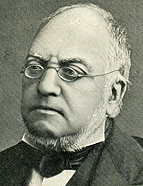

In a text from 1884, Abílio Augusto da Fonseca Pinto wrote that Joaquim Martins de Carvalho was an example of what persistence in useful work could do: ‘He climbed the slope of a steep mountain, what one might call journalistic influence, and from there he calmly and unassumingly took in the vast horizons of politics and contemporary national history. In the latter , his expertise is undisputed. He was a master of all in the investigation of facts, a guide in teaching, and an inflexible censor of misleading deviations or unconscious carelessness. ’ Born in Coimbra on 19 November 1822, a few months after the constitutional consecration of Vintismo , Joaquim Martins de Carvalho was orphaned at a very young age. The precariousness of his economic conditions prevented him from pursuing further studies, pointing him in the direction of working in trade and he began working as a tinsmith, a circumstance that suggested the nicknames Doutor das Latas [Tin Doctor] or Lord Latas [Lord Tin] by which he was known. With unswerving liberal convictions, he took part in the Maria da Fonte events, suffering for this reason ‘the torture of the Limoeiro ’ s secrets and dungeons’. A member and leader of the Carbonar i and the Freemasons, Joaquim Martins de Carvalho established himself as a notable journalist of Coimbra life in the second half of the 19 th century. A contributor to the Jornal dos Artistas [Artists’ newspaper] , O Aristarco Portuguez [Portuguese Aristarchus] and O Instituto [The institute] , he founded and edited until his death in October 1898, O Conimbricense , a title that succeeded from 24 January 1854 O Observador [The observer] , whose publication had begun in 1847. A pioneer of associative organisations, Joaquim Martins de Carvalho was linked to the most important initiatives in the life of Coimbra in his time. A man of unusual culture and curiosity, he organised, with the exceptional patience of a Benedictine , in the words of Brito Aranha, a remarkable library, which he was fittingly proud of.
This work is financed by national funds through FCT - Foundation for Science and Technology, I.P, in the scope of the projects UIDB/04311/2020 and UIDP/04311/2020.
